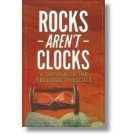Dear hijas,
To continue in my review of geologist John K. Reed’s new book “Rocks Aren’t Clocks: A Critique of the Geologic Timescale” (Creation Book Publishers, Powder Springs, GA, 2013).
One of Dr. Reed’s key points is that the geologic timescale has played a key evangelistic role for the worldview of naturalism, the worldview antithetical to Biblical Christianity. He defines naturalism as ‘the secular worldview opposing Christianity in favor of materialism (matter is all there is), and its logical derivatives: evolution, uniformitarian geology, and deep time.”
The contrast is between Biblical history and secular history. This secular history is believed to be contained in the history of the rocks–the geologic timescale. This geologic history can be distinguished from Biblical history by the use of the term “prehistory”. For secularists, prehistory represents almost the entire past of the planet–billions of years that predate human civilization, Reed says, and the template of prehistory is the geologic timescale.
He defines the geologic timescale (you’ve seen the pictures in my previous posts and studied them in your geology classes), as a linear chronology following a number of distinct ages, through four grand eons–the Hadean, Archean, Proterozoic, and Phanerozoic. The Phanerozoic, which is the most well-known, contains the eras of Paleozoic, Mesozoic, and Cenozoic. Take a look at any old geology text you may have, and you’ll see these headings clearly delineated.
So, prehistory = the geologic timescale = deep time = old earth. These terms are all somewhat synonymous, and are inextricably linked. In another article (Journal of Creation, Vol27(3) 2013), Reed and Doyle say, “Since the late 18th century, many Christian academics and theologians have embraced an old earth, claiming that it is compatible with Christianity. Even conservative Christians have been swept along. They think deep time and Christianity are like Romeo and Juliet–lovers fated to be together. The process has become predictable; scientists advance the latest iteration of the old-earth paradigm using ‘scientific evidence’ and theologians follow meekly, generating new interpretations of Genesis to accommodate it.”
What’s wrong with the word “prehistory”, you might ask? Well, it embraces the secular worldview, doesn’t it. It’s an icon of naturalism. It’s a confirmation that Biblical history is false. Christians shouldn’t use it, especially as the secularists define it. Think about what it implies, and contrast it to the Biblical worldview of a recent and mature 6×24 Creation. The two are not compatible.
Reed continues in ‘Rocks Aren’t Clocks’ that ‘one of the first issues to address is to decide which branches of knowledge are legitimate sources of truth about the past.’ He argues that ‘natural history does not belong to any one discipline, but is a mixture of science, history, philosophy, and religion. Science provides a forensic analysis, history provides a meta-narrative, and worldviews provide the necessary context for meta-theories such as creation or evolution. In other words, as we try to understand the past, we cannot avoid issues outside science.’
So then, what are the consequences of this secular view of history, this prehistory and geologic timescale, the one of which is the template for the other? ‘Whether there was a vast prehistory in Earth’s past is a question well worth asking because the answer has significant consequences’, Reed says.
Stay tuned, for we’ll pick up our discussion of the consequences of secular geologic history in my next post.
With love, I remain,
Dear ol’ Dad
Vaya con Dios mis hijas






